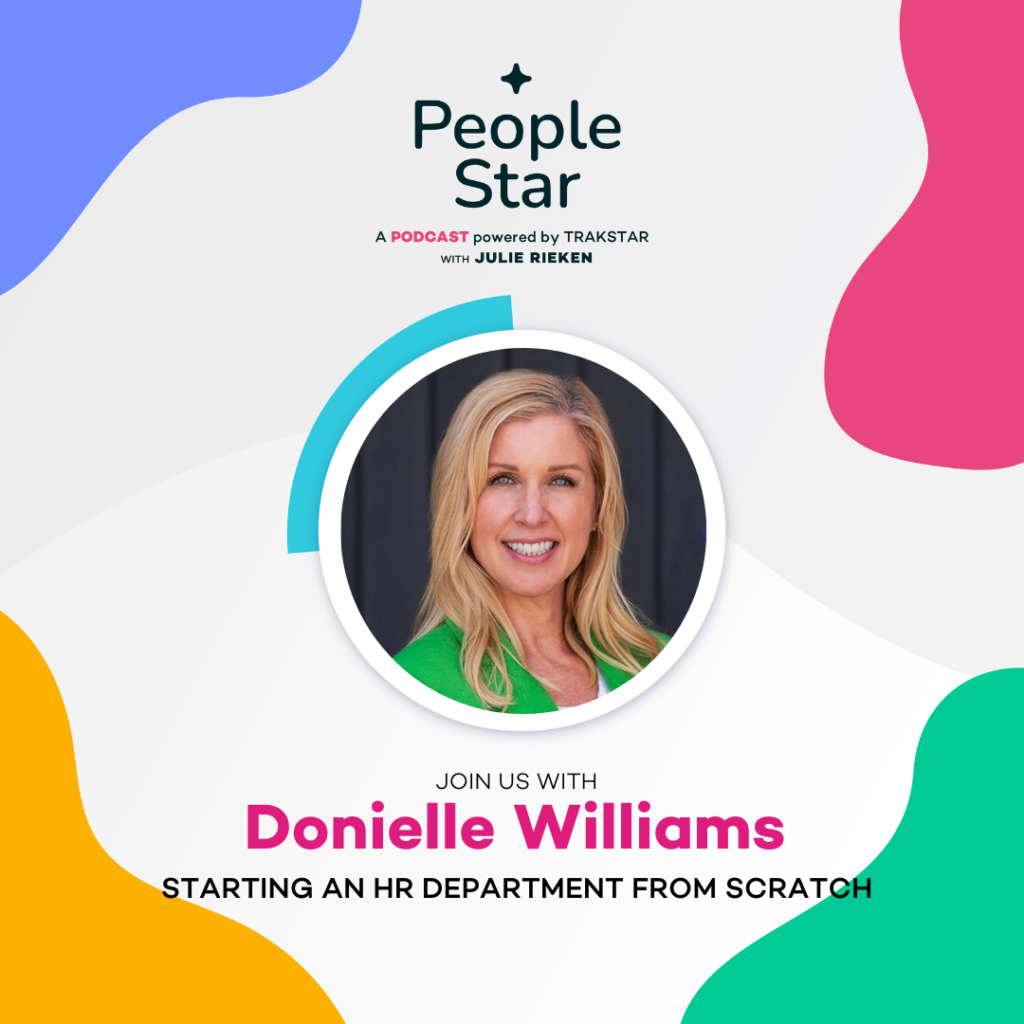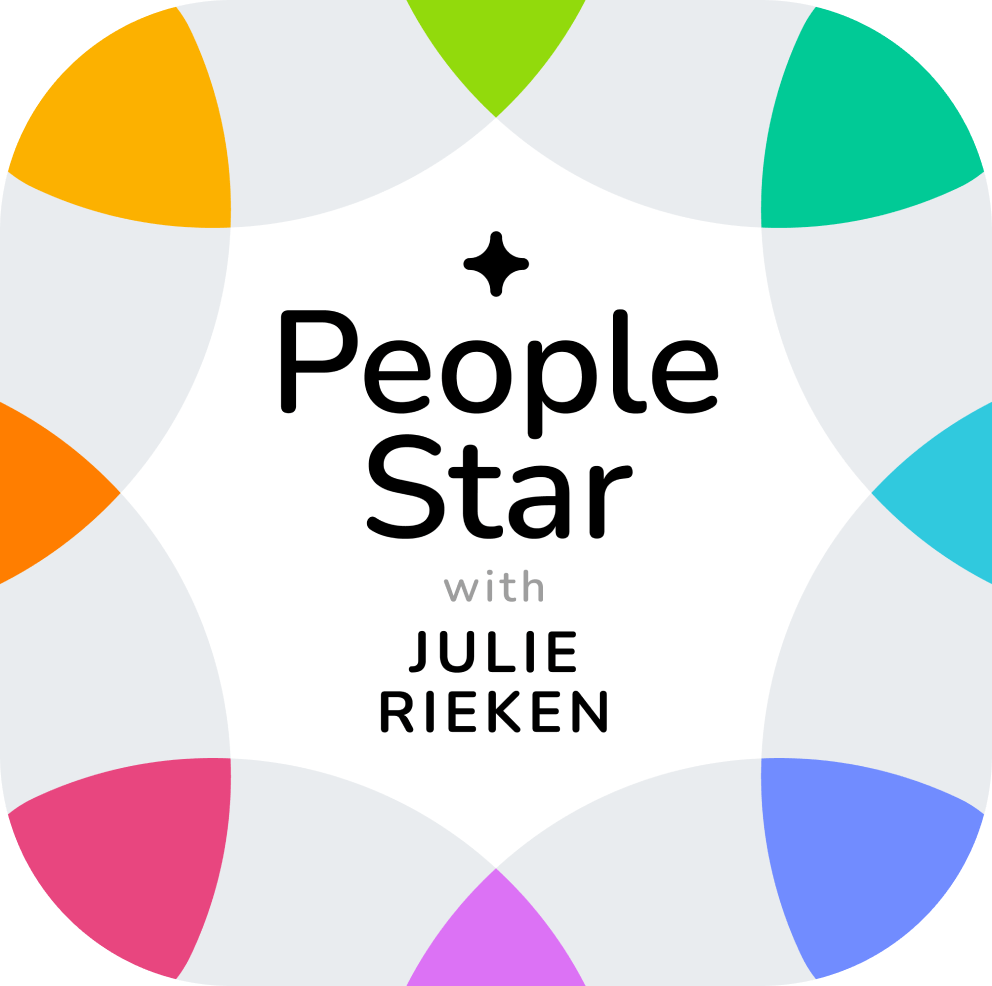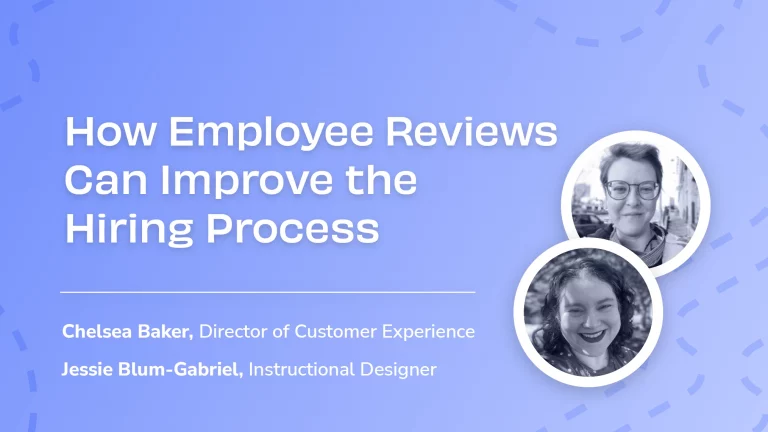PeopleStar_Donielle Wiliams: this mp3 audio file was automatically transcribed by Sonix with the best speech-to-text algorithms. This transcript may contain errors.
PeopleStar Intro:
Welcome to the PeopleStar Podcast. We deliver leadership perspectives from industry experts on their people, architecture, routines, and culture as they solve HR's newest challenges. And now your host, Julie Rieken.
Julie Rieken:
Hello PeopleStar Podcast Listeners. Julie Rieken, host of the show. Super excited today, I've got Donielle Williams with us. Donielle is an experienced HR professional, 15 plus years, and currently serves as the VP of HR Resources with XYZ, a California-based tech company. And we are going to talk today about serving in the role of when you are a HR department of one, and building HR from the ground up, which I know a lot of you out there are doing, and how you balance big picture thinking and strategic planning. Donielle, I couldn't be more excited to learn from you today about how to build HR out of nothing.
Donielle Williams:
I'm excited to talk to you, Julie. Thanks for having me.
Julie Rieken:
Thank you. Maybe I'm more excited to talk to you, but I wanted to you mention something because we were introducing ourselves to one another. You said that, literally, when you started, there were boxes of HR files and things in Tupperware handed to you. And I know this because we did the same thing here. So this is, this is something that I understand. And oftentimes, organizations find themselves in this space of building HR from nothing, and you have experience there. Can you just tell us what that was like on your first day and just give us a little background about XYZ, and how this all came about?
Donielle Williams:
Absolutely. So XYZ is, is a unique organization. We are in the tech space, but we do have a couple different business lines, mostly well known for a generation.XYZ, which is a domain registrar. And then we also have IT Media Solutions, which is our fintech organization. When I was introduced to XYZ through actually a benefits broker that I had worked with in the past and was really excited to explore the tech space because I had come out of restaurants and the beauty space, and I was like, Tech is the wave of the future and I need to jump on this, and this is super exciting. So, interviewed with the company, was really excited about what their growth looked like and their strategic business plan. And so took the, the role and then walked in on my first day and like I shared with you literally was handed a few employee files in a Tupperware bin and thought to myself, okay, this is going to be a really good challenge because the world is my oyster, I get to build this department out literally from scratch. And that's what I, that's what I started to do. That was literally my first day, and I was like, okay, where do I go from here?
Julie Rieken:
Okay, well, so let's do, let's do a couple of things. First of all, I want to extend empathy for, to you for that experience and to our current HR director here at TrakStar, who faced a similar challenge, this is a big challenge. Second, I want to high-five you for surviving some tough times. You've been at this for four years, so half of your time maybe was just coming in and getting acclimated and then everything, and then the world changed. So then it's been four, four years for you. So a great time to reflect, which I'm going to ask you to do. Think back to the first two things, you come in, you've got files in Tupperware, what are the first two things you thought about when you started?
Donielle Williams:
So I thought to myself, I'm working for a tech company and I have no technology to do what I need to do. So the first thing I did was research what we needed in terms of an HR tech stack.
Julie Rieken:
And where did that take you? Tell us about that journey.
Donielle Williams:
So that took us, and I will say they did have a couple little things, piecemeal, that they had. When I first started, they were using Intuit and QuickBooks for payroll, and then they were using bamboo HR for recruiting and onboarding. So I had to really take a look at obviously the needs of the organization, coming out of another company where I, I really went through an implementation of a full HRIS system. So I just out the gate said, I need everything from benefits, payroll, recruiting, onboarding, training, everything digitized and in one place. So we, right out the gate, I started presenting full HRIS systems. I obviously had to show them numbers and metrics. They had a little bit of turnover at the time and looked at some costs, but it was fairly easy to convince them to go ahead and implement them, we implemented paylocity, which we've been using now for three years in some change, and it's been wonderful. But that was the first thing I did. The second thing I did is, when you don't have an HR department or you haven't established anything in HR, especially in California, compliance is also another big piece that you want to make sure you have everything buttoned up. So anything from offer letters to severance agreements to any, our handbook, any documents. So that was the second thing that I tackled within that first six months to a year.
Julie Rieken:
That's a lot, that's a lot. And California, for listeners out there that don't have their HR certifications, California has a couple of unique ones because there's so much compliance. So that must have been a challenge to, to organize all of those components for you.
Donielle Williams:
It was a challenge. And interestingly enough, at the same time that I accepted a position with XYZ, I was accepted into a law program at USC. So I was going to law school at the same time that I was building the HR department here, and the focus for my degree was employment law. So it really went hand-in-hand and really fed, my education was literally feeding what I was doing in real-time.
Julie Rieken:
Donielle, that's a lot all at once. And we haven't even talked about the part of your term here, it was at XYZ that, where the world just completely changed in the middle of a law degree, Tupperware, HRIS, compliance, okay. So we've established you're a survivor. Let's go through the first couple of years. You said this, it took you a while just to get things settled. Tell us about what, if you're, for others that are out there that are building an HR department of one or building from the ground up, what does this timeline look like?
Donielle Williams:
You have to be patient with yourself because the timeline is, like I will say, it took a good year to really, well, it really takes six months to just fully understand an organization and their business. And then if they're a complex business, it may take a little bit more time. But really, the timeline was about a year in terms of getting everything up and running, ensuring that we had, you know, our basic compliance in place, training everyone on the technology. But then, you know, other things come into play, like really understanding the company culture and all the things, those external variables that also are coming at you on a daily basis as you're doing all of these like tactical things, really not strategic. I mean, they are strategic, but they're, they're your everyday tactical things. Like do we have hourly employees that can clock in? Because in California, you know, the meal time penalty, we have to track those things. So from those very basic things to then really understanding the culture and what you need to do in terms of possibly shifting some of that or recognizing how that's things are fantastic there, it's a lot. So be patient with yourself. I would say a good year, even two years, I think three years, at the three-year mark, I finally was like, I can sit back and really enjoy everything that I put in place, and this is great, so be patient with yourself.
Julie Rieken:
That's more time than I might have expected, my goodness.
Donielle Williams:
I would say it does, it is. You do have to be patient with yourself because there's a lot of things, especially if you're a department of one, that you have to handle day to day, that some of those things go on the back burner, that you don't really want to go on the back burner, but you really have to handle the day to day as well. So there's, there's a lot of moving parts, especially when you're one person.
Julie Rieken:
Let's talk about that. You mentioned you called it tactical pieces, we call them housekeeping pieces. You have to do them, right? Same thing, tactical housekeeping. And then there's this role of HR that is shifted to being more strategic, especially, I'm going to guess for you in tech at this particular time in the world, can you talk about, you take a deep breath, you've got your tactical pieces in order, what do you think about and how do you think about being a strategic partner at XYZ today?
Donielle Williams:
So today, I would say with the unique landscape that we're in, the strategy for me and being a strategic partner comes within the employer branding piece. And really how the talent acquisition piece, you know, it's a competitive market, we have a whole team of developers and engineers that can go work for your Googles, your Facebooks. And, you know, we're a smaller organization and how do we compete with that? So strategically looking at compensation and benefits and, you know, just how were we rewarding our people? What are their career paths? That really is our strategic focus right now.
Julie Rieken:
That's a big deal. The employer branding, the competitive nature of the engineering space. I almost, I want to talk about it, and there's a part of me that doesn't want to give it any value because it's scary. Because it's real, it's so real. How are you, when you're thinking about competition, branding and establishing yourself as a competitive employer in today's world, given the Googles, how do you think about it? What are some of the specific things you might, do you have a story of something specific you might have done that was intended to help address that, that challenge that you're facing?
Donielle Williams:
Yes. So we really looked at, I'll sort of step back a second, if I can, because before the pandemic, we were in, you know, in office 100%. So a lot of what we did in terms of benefits and perks and things really were around the office space. So we were an open office space, dog friendly, I set up, we had valet parking, we had a car wash, we did dry cleaning, we did so much that just, Friday lunches, we did so much to draw people into that space and really enjoy what felt like that startup tech space. So fast forward into the pandemic and then now we are a fully remote organization and leaning towards remote first now and probably going to stay that way, although we do have our office space still. How do you, I guess the question more was, how do we take all those wonderful perks and benefits that made us so competitive and shift them into this remote space? So, and we're still working on it. So it's taking a look at what are the things that we can add. So we had Friday lunches. Now, what do we do because they lost their Friday lunches? Well, now we have Uber eats, so everybody gets an Uber eats allowance and they get their lunch, you know, their Friday lunch paid for by the company still, but it's being delivered to their home. How do we improve our, our benefits and shift some of those perks, so we've done a lot of online events with our team through various companies, and we are improving and changing our, our benefit offerings. So really addressing also wellness and mental health and what are, what is our team need now? So really just taking a look at how to stay competitive, but now in a remote landscape when we were so competitive in an in-office space and it's been a challenge, but we continue to look at that daily. That is a focus of mine. I just continued, how can we add value to our team members? What is everyone, what are our competitors doing? What does that look like for us? You know, we're lucky our compensation is great. So we're very competitive in the compensation space and I think benefits and perks were doing pretty well, given we're a small organization. But again, I'm constantly researching and looking out there. What's the next level thing that I'm going to have to introduce to the organization and and bring on board to retain our talent and attract new talent.
Julie Rieken:
Yeah, that's a challenge. And we, like you, were, we had an office and then pandemic hit and we closed well, we closed one office because the lease ran out and, but we still have one and we are, we haven't gone just remote friendly. We're now remote first like, like you're describing. And it's really shifted the way that we think about things and presented new challenges. It sounds like you're, you're tackling those challenges with still some, some things that are like the uber eats is a great is a great idea. Gosh, all those shifts have really, have really adjusted the workplace. Donielle, let's close with a piece of advice you might give someone. Now, you've talked about being patient and giving yourself three years, you've talked about your tech stack. I'm interested, though, if anybody else is doing this, what, do you have any other advice that you might give them that you think, hey, here's one other thing that I want to share for anybody that's building a department from scratch?
Donielle Williams:
I will share that having a network is, a network of other HR professionals can be super helpful when you're a department of one. So really understanding who's in your world, who's in your space, or reaching out to other HR folks and building that network for yourself so that when you come up against problems within an organization that you're trying to solve, you can actually reach out to someone that truly understands your space and what you're going through. Because although I have an incredibly supportive CFO and an incredibly supportive CEO and founder and VP of operations, they will never truly understand things from my perspective. But if you have an arsenal of HR folks that you can reach out to as a Department of One, I encourage you to do that or build that for yourself, because that will be your saving grace.
Julie Rieken:
That is great advice. It sounds like you have a network. Where have you found your group?
Donielle Williams:
I've been very fortunate. I've done a lot of consulting in my past for HR and I've just been able to work with a lot of wonderful HR folks, talent acquisition people, and just have remained in that space with them, just become friends and network. And I want to say HR folks are very social people, I know I'm a very social person, so being able to.
Julie Rieken:
You know, rowdiest group of people you've ever met around.
Donielle Williams:
Exactly. I think I don't know what our Christmas party is. I'm kind of the one throwing myself out there. But yeah, so they want to talk. We want to talk. So I've just kept in touch with a lot of folks and it's just naturally has happened and it's a wonderful group of people that have and I hope to continue to add people to that group because it's twofold. You know, you're getting help from people, but then also as you bring new people on, you're helping others, and it's just such a good cycle to be involved in.
Julie Rieken:
This has been so interesting to me. I really appreciate you sharing your experiences with us. The last four years have been a challenge, you have clearly built something special and important from the ground up, from Tupperware to a full HRIS stack to moving to, oh my gosh, what a story. Donielle, I've really enjoyed this and I know our listeners are going to enjoy it too, and I hope they've learned as much as I have today. Thank you for being a guest.
Donielle Williams:
Thank you for having me, Julie.
PeopleStar Outro:
Thanks for listening to the PeopleStar Podcast. For the show, notes, transcript, resources, and more ways to get a seat at the table, visit us at TrakStar.com/Podcast.
Sonix has many features that you’d love including enterprise-grade admin tools, world-class support, collaboration tools, share transcripts, and easily transcribe your Zoom meetings. Try Sonix for free today.




